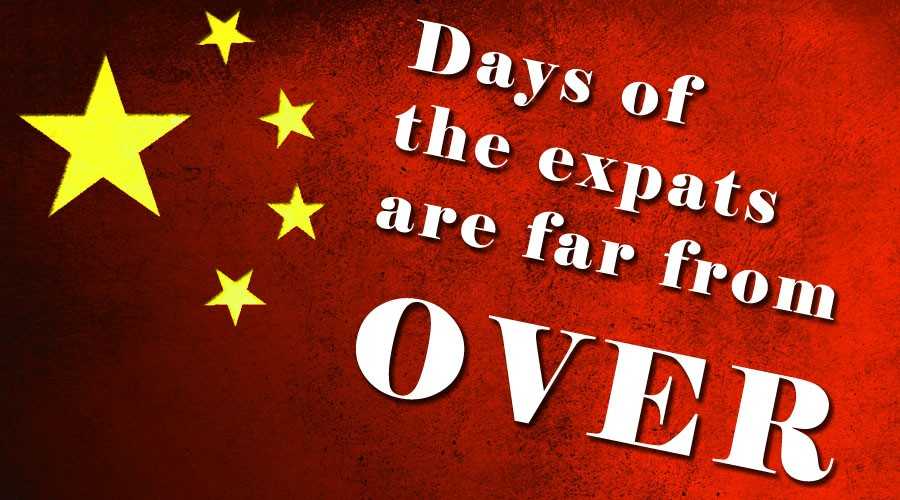Debate continues about value of non-Chinese over returnees
The fact is, if you ask a thousand professionals in China whether or not expats are still valuable, you will get at least a thousand different answers, possibly more. In 10 years of living in Beijing and commuting between Shanghai and other cities, and after talking to hundreds of people about the role of the expat, particularly the role of the expat versus returnee, I have come to some conclusions, which I share with you here.
Let us first analyze the returnee’s role in Chinese business. Returnees (those of Chinese descent who have been brought up or at least studied overseas) usually straddle both sides of the cultural hemispheres: On the one hand they look and speak Chinese, they have (usually) been bought up by Chinese parents and therefore have fairly strong Chinese values, yet they have also been immersed in Western culture, usually American, Australian or British. You might think therefore that these people prove to be excellent candidates for general management positions because of a dual understanding of cultures and behaviors of Chinese and non-Chinese alike.
Second, of course returnees quite often need no temptation to come to China: it is not some midlife adventure for them, it is often a homecoming to family members and distant memories that they actively want to become re-acquainted with. Naturally then, it is not quite as necessary to entice them with ego-bolstering salaries and attractive package increments, making the returnee a more appealing financial proposition for the employer.
Practically speaking the returnee also has the benefit of being bilingual, and, in a country that despite the efforts to rebalance, has an economy still largely based on foreign trade and export, the returnee has a much easier time of it communicating with the folks overseas who are buying the goods made in China.
Of course the most important issue, when we are talking general manager or senior management level expatriates is that still the packages are vast, almost beyond belief. Someone I know well, who for the sake of this we’ll just call Very Lucky, has a travel budget back to his home country of 600,000 yuan per year ( $90,000; 85,600 euros) for a family of five to travel business class. It is not unusual for an accommodation budget to be 100,000 yuan a month. That is much more than a million yuan a year just to put a roof over your head. Then of course there is the expectation of a base salary (depending on industry sector) of between one and two million yuan a year plus bonus, plus car. If you add all of that up, you would not want to be the HR person who has to justify that cost.
So, there are some very compelling reasons to look at returnees as general manager candidates: culturally fit, desire, cost and practicality. Let us examine then why on earth there are any expats left.
First, if we dip in to recent history we should not forget that until very recent years China was a great unknown. When I was five years old, China to me was Hong Kong. The point, of course, that I am making is that although on the one hand China is still a very exciting market for business, and even in the new normal of 7 percent growth, you just have to be here, many companies are still very cautious of China, and want their own nationals on the ground.
There are also many industries and business sectors in which China lacks homegrown knowledge. Pollution management is a relevant example, and other areas, including information technology. So it is strategically sensible of China to encourage foreigners with the know-how in these sectors to remain in the country.
One of the most important reasons that us foreigners are still an asset in China is that the investment pendulum has swung dramatically from inbound into China to outbound investment of Chinese companies in the West. Westerners are familiar with the way things are done in China and in their home nations to facilitate further expansion overseas. You only have got to walk into an electronics store in the UK and half of the fridges on display proudly bear Chinese badges. If this is to continue there is an undoubted need for Western know-how. Just today I read an article saying that a Chinese firm has taken a 5 percent stake in a major UK holiday firm to encourage the Chinese middle classes to go and sun themselves (with umbrellas of course) in Spain and Greece.
So, I think it is fair to say that China is not done with the expat quite yet, but roles are changing, faster than we realize. It is also worth noting that some so-called returnees, although perhaps oriental in appearance, can be so far removed from their Asian roots that they know as little as I did about China when I first landed in Beijing.
My verdict is this: look at the numbers. China is not managing to master domestic consumption nearly as quickly as it would like, and, frankly, the economy is still heavily reliant on consumers in Europe and North America, and even though there is an up-skilling of the Chinese workforce, it does not mean that Vietnam and Indonesia have completely taken over yet. Similarly, as a society, China may have advanced rapidly in wealth and disposable income, but has the heart of society caught up with the pace of commercial growth? I think not.
Finally, let’s take a lightning fast look at trends. The US is a country built by foreigners. The UK gets more multicultural as every month passes, so as China becomes more hooked on Western preoccupations of earning, spending and general openness, why would society do the opposite and become less inclusive of non-PRC nationals? It simply does not follow.
The author is CEO & Founder of RMG Selection.
Read the orginal article: China Daily European Weekly 03/13/2015 page9


